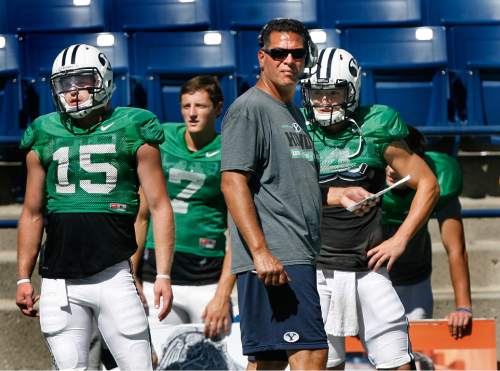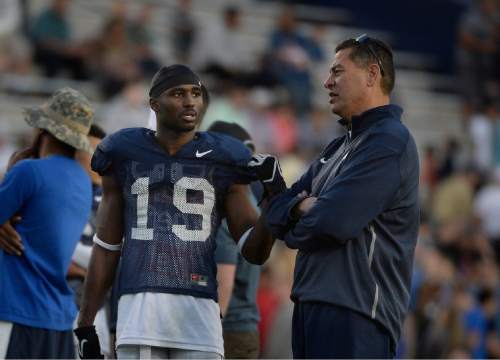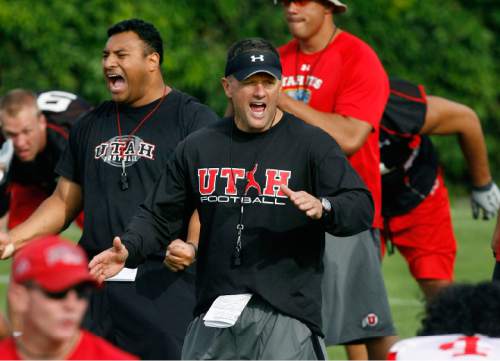This is an archived article that was published on sltrib.com in 2015, and information in the article may be outdated. It is provided only for personal research purposes and may not be reprinted.
In the fog of hiring possibilities at BYU, the realistic possibilities, there's a smart, savvy, clear path for the Cougars to follow. It is bordered by sensitivities and those should be considered and respected. But let's just blurt it on out and dress it up from there.
BYU should hire a Polynesian head football coach.
If that offends anybody, if that's out of bounds or seems racist … it's not.
It's practical, it's groundbreaking for BYU, it makes a lot of sense.
There are obvious qualifiers here which are required beyond the ethnic makeup of the new coach. He has to know his football, be able to recruit, be able to lead and motivate, be able to relate to players, students, fans and boosters. He has to get the quirks, nuances, peculiarities, challenges, blessings of coaching at BYU, comfortably be the face of BYU football. And, it is said, he has to be Mormon.
Supposing all of that's covered.
Supposing all of that's equal.
If I'm BYU, I tilt Polynesian.
There are a couple of reasons.
First, BYU has never had a minority head football coach. It would be a great move for an institution owned by a church that is international in scope and that likes to portray itself as that, as something more than a bunch of white guys from Utah. If BYU football is one of the highest profile attention-grabbers for the LDS faith, wouldn't it make sense for the head of that enterprise to represent the kind of inclusiveness the greater church is trying to express?
In the recent film, "Meet the Mormons," there was a whole lot of representation outside the standard 45-year-old Caucasian male, selling insurance, living in Midvale, driving a minivan, with eight kids and a dog named Buster. In fact, was there any of that?
Second, and most important, having a qualified Polynesian head coach would make the connection thicker between the Cougar program and Polynesian athletes upon whom BYU football has depended since the early days of LaVell Edwards.
Those athletes are too numerous to name here, and there's no need to name them. Everybody knows who they are, what they've accomplished. Everybody also knows many of those names that BYU missed on, those athletes preferring, for whatever reasons, to go elsewhere.
Not all of those great Polynesian football players were or are LDS. But many of them were and are. Currently, those names are sprinkled all around terrific football programs, especially in the Pac-12.
Establishing further ties with Polynesian recruits, maybe more than any other thing, would help BYU overcome some of the recruiting disadvantages it faces.
Not every Mormon Polynesian wants to play at BYU, and that's good, too. There are all sorts of opportunities for Polynesian players at other schools, and they will go on exploring and taking good advantage of them.
Not every Mormon Polynesian player would want to play for a Mormon Polynesian head coach at a Mormon school that isn't in a P5 league. Not saying that here.
But it is reasonable to think some would, maybe more would, if BYU hired the right Polynesian head coach, with all the aforementioned qualifications, one who could take what Bronco Mendenhall did and expand it, build on it, in part, by opening up that recruiting pipeline and getting some accomplished athletes on whom BYU presently is missing out.
When great coaches are out there, an established head coach like Ken Niumatalolo, who happened to be highlighted as Navy's mentor in "Meet the Mormons," or a defensive coordinator like Kalani Sitake, who played at BYU, it would be foolish for the Cougars not to fully examine and exhaust those possibilities.
Despite their reputation of being relatively cheap when it comes to paying head coaches, BYU has the money, thanks to booster funds, to lure in candidates with a higher price tag. One high-ranking booster told me there is a fund in place to pay BYU's next football coach, the right coach, up to $2 million a year. That may not be top dollar on the national scene, but it is much more competitive than terms of the past.
There are available Polynesian coaches who are not what BYU needs, guys who are neither qualified nor well suited to be and do what a head coach at the school right now needs to be and do. Robert Anae, for instance, doesn't seem to fit.
But there are candidates who could be hired, who should be offered, if BYU is smart enough to see what's plain to see, to connect its coach to its recruiting base, and progressive enough to do something it's never done before.
GORDON MONSON hosts "The Big Show" with Spence Checketts weekdays from 3-7 p.m. on 97.5 FM and 1280 AM The Zone. Twitter: @GordonMonson.







